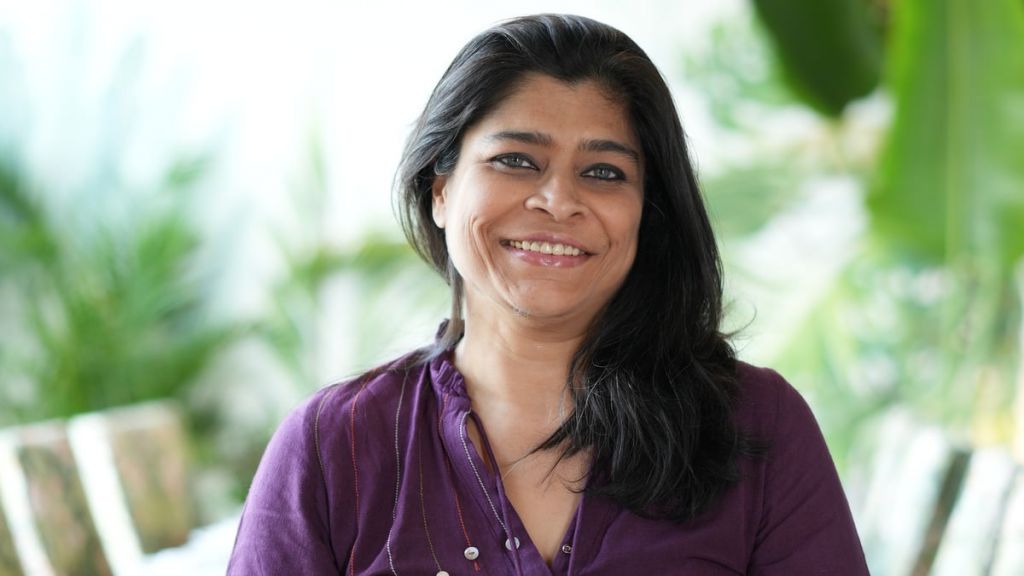
Curating and hosting the ongoing Zaffran festival at Ishaara in Mumbai, Ruchina Munshaw Ghildiyal passionately talks about the main ingredient of the fest – saffron. “It was during one of the interviews I did for Spice Chronicles with RMG that I fell in love with saffron,” Ruchina admits. “Saffron only flowers when the conditions are right. It has to be handpicked. There's no machinery involved. It's hand separated and each flower gives you some three stems. So million flowers give you one kilo of saffron. This was so fascinating that… I was like… I have to visit saffron farm and witness the harvest. And my partner in crime, Prashant of Ishaara, was keen too. So we visited the harvest in 2024 November and planned to have a menu around this unique spice of India.”
Ruchina’s journey from an animation designer to a celebrated chef is nothing less than an interesting filmy adventure. Imagine a Gujarati girl, grown up eating vegetarian, kathiawadi food gets married to a Garhwali and stays in Uttarakhand after that. West gets married to East and transports herself to a different culture. Good one-liner to build a film on, right? Well, that’s Ruchina for you.
A born foodie Ruchina stepped into the role of a homemaker at the Gadhwal home and in her eagerness to make her family happy and serve her husband the food he grew up eating, she searched for Gadhwali recipes. To her disappointment, there was not a single book available. Ruchina took it on to herself to document the recipes that she learnt from her mother-in-law. This was the beginning of a new era in her life.

“It all happened after I had a baby. I was at home with a chota baby – my daughter. Not working. And that was new for me. I utilized the time to document the recipes I had learnt from husband’s family and friends. I wrote an essay on a website about Garhwali food. That's where my food writing career started. It just kind of found me rather than me finding it,” shares Ruchina.
Shift to Mumbai via Chandigarh was another major turning point in Ruchina’s life. “I attended a workshop where while introducing myself, I said ‘I am writing a cook book’ and to my surprise the Anton Lewis, the conductor of the workshop asked if I was the same person who wrote the essay! And then circled back because I saw so many similarities to then understand Gujarati food, which until then I hadn't really deep dived into anything.”
This was just the beginning for Ruchina. Soon she was doing varied surveys and writing about food for many publications. Bombay also opened the doors for consultancy, food styling and more and thanks to Ruchina, the city got its first Kitchen Studio. Few years later, she got restless and wanted to travel and do something new, so closed down the studio. “And I think the timing was just right. I closed down in 2019 and then the pandemic hit us.”
Pandemic came as a boon to Ruchina. She explored the merits of social media and Spice Chronicles was born. “What was planned as a 30 days, 30 episodes about each state in India, turned out to be a 150 episode marathon where I peeped into spice boxes of so many people.” Not just the podcast, but pandemic took her back to Uttarakhand. And they decided that that they want to be rooted in their roots. They shifted back, this time for good.

Pandemic also gave Ruchina the time and space for her research and travel that she always wanted to do. And this research gave rise to many more programs like Swad, Zaffran and more. The diversity that she experienced in regional cuisine intrigued her. “The food that we eat is actually driven by the microclimate, not by politically divided regions,” Ruchina tells. “We eat based on climate. Our kitchens are also based on that. Kitchen in Kashmir is very different from a kitchen in the South and it's because of that. Kashmir is cool and the ambient temperatures in the kitchen are cold, so everything is cooked in them because you're conserving all your resources and that's across the Himalayas. Whereas you go to the tropical areas and the ambient temperatures bound, so you have open pots. You have a lot more brazing and so this kind of these patterns kept revealing themselves wherever I sort of is.”
She elucidates further that even science and Ayurveda supports the diversity theory of eating seasonal and regional food to get the best health benefits. “Science supports that saffron is happiness inducing. Or we had/have ritucharya in Ayurveda which asks us to it seasonal food.”
Ruchina was also disappointed when her research revealed that despite the diversity, not much is represented in the restaurants of the country. “I always complain to Prashant that why do restaurants talk about only Kali dal and pili dal? We have such huge reptoire of dals in the country.” This complain has now led to a new project – Dal Bhat – where Ruchina will be focusing on one Dal grain and one rice grain every month and creating a story out of it and working to source the grains from particular farmers. “This is my attempt to get diverse dals, and the vegetables that go with it to the fancy crowd that considered them to pedestrian till today.”
Staying grounded and connected to her roots, Ruchina has much more in her bucket list. “I want to explore nook and corner of the country and bring the regional dishes, ingredients – forgotten ones included – to the plate of a restaurant. That’s my mission,” she concludes.